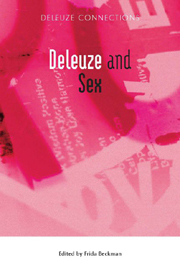Book contents
- Frontmatter
- Contents
- Acknowledgements
- Introduction: What is Sex?: An Introduction to the Sexual Philosophy of Gilles Deleuze
- 1 Alien Sex: Octavia Butler and Deleuze and Guattari's Polysexuality
- 2 Heterotica: The 1000 Tiny Sexes of Anaïs Nin
- 3 Haemosexuality
- 4 Disability, Deleuze and Sex
- 5 Tongue and Trigger: Deleuze's Erotics of the Uncanny
- 6 (Hetero)sexing the Child: Hans, Alice and the Repressive Hypothesis
- 7 The ‘Non-Human Sex’ in Sexuality: ‘What are Your Special Desiring-machines?’
- 8 Deleuze and Selfless Sex: Undoing Kant's Copernican Revolution
- 9 A Preface to Pornotheology: Spinoza, Deleuze and the Sexing of Angels
- 10 Encounters of Ecstasy
- 11 Beyond Sexuality: Of Love, Failure and Revolutions
- Notes on the Contributors
- Index
2 - Heterotica: The 1000 Tiny Sexes of Anaïs Nin
Published online by Cambridge University Press: 12 September 2012
- Frontmatter
- Contents
- Acknowledgements
- Introduction: What is Sex?: An Introduction to the Sexual Philosophy of Gilles Deleuze
- 1 Alien Sex: Octavia Butler and Deleuze and Guattari's Polysexuality
- 2 Heterotica: The 1000 Tiny Sexes of Anaïs Nin
- 3 Haemosexuality
- 4 Disability, Deleuze and Sex
- 5 Tongue and Trigger: Deleuze's Erotics of the Uncanny
- 6 (Hetero)sexing the Child: Hans, Alice and the Repressive Hypothesis
- 7 The ‘Non-Human Sex’ in Sexuality: ‘What are Your Special Desiring-machines?’
- 8 Deleuze and Selfless Sex: Undoing Kant's Copernican Revolution
- 9 A Preface to Pornotheology: Spinoza, Deleuze and the Sexing of Angels
- 10 Encounters of Ecstasy
- 11 Beyond Sexuality: Of Love, Failure and Revolutions
- Notes on the Contributors
- Index
Summary
‘Life is a process of becoming’
(Nin 1964: 11)Ambivalently described as ‘feminist smut’ (Carter n.d.: 97), Anaïs Nin's erotic writings have been contentious ever since the publication of Delta of Venus (Nin 1981). These privately commissioned tales were written at a dollar a page for a male client in the 1940s and include some ideas from male authors. Yet, in a milieu where feminists were celebrating gynocentric literature, many women readers (myself included) found pleasures in their ‘ambulant and bohemian’ style and in an erotic expression different from masculinist material (Nin 1981: 117). A male literary assemblage can obviously be mapped between Nin and Deleuze and Guattari via her lovers Henry Miller and Antonin Artaud, as well as D. H. Lawrence, on whom she wrote a eulogistic book (Nin 1964). Though it is necessary to refer to Lawrence and Miller, here I want to explore Nin's significance for a Deleuzian project on sexuality in her own right.
Some men writing on female-centred erotica are patronisingly dismissive. For Andrew Ross, women's material features ‘stylised romantic settings, more intricate narrative frames and build-ups, extended foreplay, and scenarios of mutual pleasure’ (Ross 1993: 239). Revisiting Nin's prose for a Deleuze-inflected study, I become very conscious of the dif- ficult nature of the research process. A decade ago, my work on obscene poetics was informed by Laura Mulvey's study of cinematic voyeurism as well as the transgression theory of Georges Bataille and his 1990s avatars (Powell 2002).
- Type
- Chapter
- Information
- Deleuze and Sex , pp. 50 - 68Publisher: Edinburgh University PressPrint publication year: 2011



